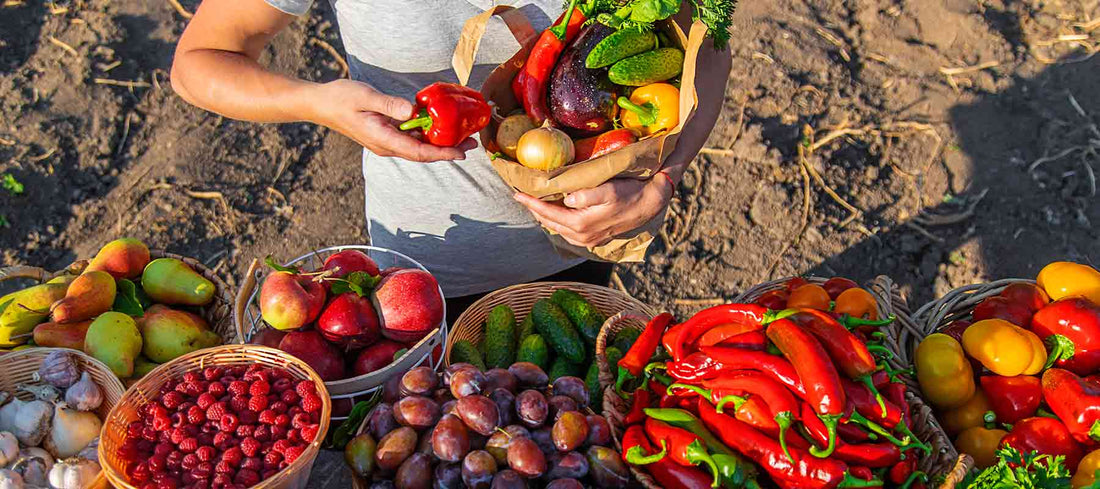
The Organic Advantage: Unlocking the Health Benefits of Eating Organic
In today's fast-paced world, the choices we make about the food we consume can significantly impact our health and well-being. With the growing popularity of organic eating, many individuals are empowering themselves by exploring the numerous benefits of choosing organic products.
We have written this guide to delve into the benefits of eating organic and shed light on the health benefits of yerba mate, an often-overlooked superfood in the organic category.
What Does Organic Mean?
Before we start to talk about organic food, it's essential to understand what "organic" means. Organic means grown without the use of any GMOs or genetically modified organicisms; this is the first pillar of organic farming; the second pillar is growing without the use of synthetic pesticides, herbicides, or fertilisers. Organic farming aims to promote ecological balance and biodiversity, making it not just a dietary choice but also a lifestyle commitment.
Healthier for You and Your Family
The main reason people choose organic foods is due to their perceived health benefits. Here's a closer look at why eating organic may be beneficial:
Nutrient-Rich
Organic foods are often regarded as more nutrient-rich than their non-organic counterparts. Research suggests that organic foods may contain higher levels of nutrition. Nutrition is the reason we eat; nutrients are essential for life.
No Harmful Chemicals
By choosing organic, you minimise exposure to harmful chemicals. Non-organic food is frequently treated with pesticides and artificial additives, which can lead to adverse health effects when ingested over time. Organic foods are grown without these substances, making them a safer choice for you and your family.
The Environmentally Friendly Choice
Eating organic isn't just beneficial for personal health; it also contributes positively to the environment. Organic farming practices prioritise environmental sustainability. Here's how:
Enhancing Soil Health
Organic farming methods promote healthy soil through natural composting and crop rotation techniques. This results in enriched soil quality, sustaining local ecosystems and preventing soil degradation.
Preserving Biodiversity
Organic farms support diverse ecosystems by avoiding monoculture farming procedures that can harm local flora and fauna. Increased biodiversity leads to natural pest control and pollination, benefiting the entire agricultural system.
Promoting Local Economies
When you purchase organic products, you often support local farmers and communities. Organic farming tends to be more labour-intensive, resulting in more job opportunities and sustainable economic growth in rural areas.
Understanding the Health Benefits of Yerba Mate
Among other superfoods, yerba mate shines brightly in the organic food sphere. This traditional South American beverage is not only a delightful drink but also packed with numerous health benefits that are worth considering.
A Powerful Antioxidant
Yerba mate boasts a high concentration of antioxidants, which help neutralise free radicals. By integrating yerba mate into your diet, you can protect your cells and promote overall health.
Boosting Energy and Mental Clarity
The health benefits of yerba mate extend to providing a natural energy boost. Containing caffeine and other compounds that can enhance alertness and clarity without the jittery side effects often associated with coffee.
Enhancing Metabolism
Yerba mate may also improve metabolism, promote fat oxidation, and aid in weight management. Incorporating this superfood alongside a balanced diet can be a complementary strategy for those looking to shed pounds.
Choosing Organic Products
When transitioning to an organic lifestyle, it's important to know how to choose the right products. Here are a few tips:
- Look for Certification: Always look for certified organic labels, which guarantee that the product meets specific standards.
- Buy Seasonal and Local: Purchasing local organic produce can support the local economy and ensure fresher food options.
- Read Ingredients: Always check the ingredient list for non-organic additives. Opt for products with fewer and more recognisable ingredients.
Addressing Common Misconceptions
Even with the growing popularity of organic products, certain misconceptions persist. Let's clarify some of the most common:
Organic is Always More Expensive
While organic products may sometimes come with a higher price tag, it is not a hard and fast rule. Buying in bulk, seeking local farmers' markets, or shopping during the off-peak season can lead to significant savings.
Organic Foods are Not as Tasty
Taste is subjective, but many people find organic foods to have more intense flavours than non-organic options. This is often attributed to the farming practices that encourage natural flavour development.
The Community Aspect of Organic
Joining the organic movement is not just a personal choice, it's a communal experience. Engaging with local organic farmer's markets, community-supported agriculture (CSA) programmes, and organic cooking classes can help strengthen community bonds and promote a healthier lifestyle, fostering a sense of belonging and connection.
More Than Just Food
Choosing organic goes beyond food choices—it's a lifestyle. With the surge in awareness regarding health and environmental issues, going organic can become part of your overall mindset and practices. Here are a few lifestyle changes to consider:
- Upcycle and Recycle: Invest in products that are sustainably packaged and consider ways to reduce waste.
- Educate Yourself: Stay informed about organic practices and how they impact health and the environment.
- Support Change: Cheer policies and initiatives that promote organic farming and consumer awareness.
Embarking on Your Organic Journey
Transitioning to an organic lifestyle is a personal journey that requires patience and dedication. Here are some tips to get you started:
Start Gradually
Making the switch to organic doesn't have to happen overnight. Begin by incorporating a few organic products into your shopping cart each week, gradually replacing non-organic products over time.
Plan Your Meals
Meal planning can allow you to focus on incorporating organic ingredients effectively. Avoid impulse purchases by planning ahead and instead opt for organic varieties that benefit your health and the environment.
Your Organic Future Awaits!
As you explore the many benefits of eating organic, remember that you are making a choice that extends beyond personal health—it's a commitment to a healthier world. Embrace the organic lifestyle, and consider adding superfoods like yerba mate to your diet for a long-term, energising and nutrient-packed addition. Every small change makes a difference. Let the journey to health begin right here, right now!
